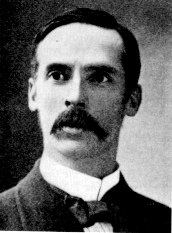| Profile | Major Works | Resources |
John Atkinson Hobson, 1858-1940.

English historicist economist, underconsumption theorist and apostle of the "New Liberal" movement.
The son of a Liberal newspaper publisher in Derby, John A. Hobson was educated in the classics at Lincoln College, Oxford. After graduating, he became a schoolteacher and a journalist. After moving to London in 1887, Hobson came into the circle of the Fabian socialists in London. Although he contributed a couple of volumes (e.g. 1891, 1896) to the Fabians, he was too unenthused by Marxian theory and socialist schemes to remain a subscribing member.
John A. Hobson, like his friend L.T. Hobhouse, was part of the "New Liberal" generation that recognized the deficiencies of laissez faire in addressing social problems. At root, Hobson was still a liberal, to the end still a believer in free markets, a solid defender of free trade and highly suspicious of governments, but recognized that markets could not solve problems like poverty, education, and, most pertinently, general overproduction. Hobson was thus a strange concoction, a market liberal associated to socialist schools, who managed to be simultaneously fond of both Richard Cobden and John Ruskin. Hobson articulated an "organic" view of society, which saw free and realized individuals as essential to a healthy social organism. In his memoirs, Hobson recalls reading Herbert Spencer's works in his youth as being the formative influence on his outlook.
Hobson was an accomplished author, journalist, historian, economist and critic of the materialist methodology of both Classical and Neoclassical economics. In some ways, he is the closest thing to the American iconoclast Thorstein Veblen that the British Isles produced (Hobson would later write a panegyric volume on Veblen). Professionally speaking, however, Hobson was ostracized. Hounded by the Classical and then the Marshallian orthodoxy, Hobson never attained an academic post, living perennially on the margins of journalism and extension lecturing, and was basically barred from the Political Economy Club and ceaselessly ridiculed in that bastion of Marshallian thought, the Economic Journal. Reputedly, the editor F.Y. Edgeworth regarded Hobson's works as on the same level as flat earth babble.
Hobson's fame today rests n his development of a theory of underconsumption (1889, with the businessman and mountaineer A.F. Mummery). Hobson rejected Say's Law - to an extent; he recognized that savings translated into investment, but investment spending itself contributed to future overproduction, so that capitalism would be gripped by chronic overproduction. Hobson was one of the first economists since Malthus to articulate and defend an undercomponsumption theory of the trade cycle. John Maynard Keynes would later acknowledge Hobson as a precursor. Hobson expanded upon this in his 1909 treatise on the Industrial System, probably his best economic treatise, where Hobson advocated practical schemes like redistributive taxation, welfare spending and nationalization of industry to deal with the problem. Hobson's tract was reputedly influential upon Lloyd George's "people's budget" of 1909 - or certainly helped sell it. His principal economic ideas were distilled in his slimmer Science of Wealth (1911).
Other significant economic contributions include Hobson's famous 1891 critique of the Classical theory of rent in the QJE. His proposed generalization anticipated the Neoclassical "Marginal Productivity" theory of distribution by a couple of years. However, Hobson later (1909) disputed the "product exhaustion" thesis of that theory, a criticism which several contemporaries (such as Marshall) answered with difficulty. Hobson's work on social welfare (e.g. 1901) was slightly better received in his day. Hobson's stock has since risen, not only for the afore-mentioned contributions, but also for his "evolutionist" outlook on economy and society, from its early statements (e.g. 1894) to its later elaborations (esp. his 1914 Work and Wealth 1914 and its 1929 "update").
Hobson also extended his underconsumption thesis to his theory of imperialism. . Hobson had worked as a journalist in South Africa for the Manchester Guardian on the eve of the Boer War, and upon his return published several a series of articles and books on imperialism and militarism. Imperialism (1902) is perhaps his most famous book. Its economic thesis on capitalism's search for new markets for overproduction (anticipating Rosa Luxemburg and Vladimir Lenin) is only part of it. The bulk of it deals with the politics of it - in particular, to tackle the apparent anomaly that any produced surpluses can be easier gotten rid of by free trade than by the expense of imperialism. Hobson concludes the impetus comes not from business as a whole, but more narrowly from the financial sector, from the managers of the oversaved fortunes. They're not looking for markets for goods, but for outlets for speculative investment overseas, and that is facilitated by extending the political jurisdiction on the ground. It is the financiers, Hobson accuses, by direct control of the press and indirect control of government, that whip up nations into jingoism and imperialist adventures.
Hobson opposed World War I, but also opposed the post-war settlement, and was critical of both the Treaty of Versailles and the League of Nations. Like many of the New Liberal generation, Hobson eventually abandoned the Liberals (over their abandonment of free trade principles), and, holding his nose, joined the Labour Party in 1919. After this period, that Hobson's reputation had a lift. Although his general underconsumptionist thesis remained unchanged, his audience has had changed their opinions in the post-war years and his works were reviewed more favorably than before.
John A. Hobson lived long enough to see the advent of the Keynesian Revolution, and wrote his memoirs (1938) with some satisfaction in vindication.
|
Major Works of John A. Hobson
|
HET
|
|
Resources on John A. Hobson
|
All rights reserved, Gonšalo L. Fonseca
